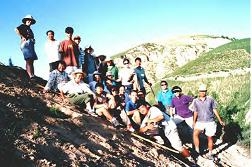 |
| Mr. Liang Congjie on the cover of Asia Week (google.com) |
Friends of Nature became China's first legal, environmental NGO (non-governmental organization) in 1994. "We knew from television about Greenpeace. But there wasn't anything like that in China. My friends and I began wondering, why not here? We decided to try." These words were spoken by Liang Congjie, co-founder and president of Friends of Nature (FON). His "friends," the other founding members of FON, were 3 of his fellow teachers at the Academy for Chinese Culture, a private Philosophy institution. Today FON has added more "friends," including students, teachers, taxi drivers, factory workers, mothers and many others to its burgeoning ranks of well over a 1,000 people. "Membership," says Congjie, "is everybody. It's less like a western environmental lobby and more like a club. We have a homey atmosphere and I like it that way."
FON's mission is to promote public environmental education and to cultivate in the Chinese people an appreciation for nature and a desire to protect it.
 |
| Pollution in China (www.carbon.cfr.washington,edu) |
China, frequently referred to as the world's FACTORY, has had to come to grips with its worsening environment -- deforestation, dust storms, trans-border water pollution, air pollution. In some cities, air pollution creates 160 bad-air-days a year and the list goes on. The 1992 UN EARTH SUMMIT held in Rio de Janeiro, Brazil produced a DECLARATION of 27 PRINCIPLES to limit damage to the natural world. After this wake-up call, China published its strategies for sustainable development in March of 1994, revealing a large array of environmental laws and policies.
About this same time the Internet was quickly taking hold in China. As a result, Internet-fuelled activism exploded. Cyberspace allowed the environmental messages from international groups like Greenpeace and the World Wildlife Fund to make its way to the Chinese public at large. Following in the footsteps of FRIENDS OF NATURE, these organizations have set up offices in China for the first time.
 |
| Friends of Nature---Planting Trees (www.fon.org) |
It has taken great courage to blaze the eco-warrior trail in China, but Mr. Congjie and Friends of Nature have had great success by working with, not against, the state-run media. According to Mr. Congjie, "Radical activism is not practical in China." The Chinese government has regulations in place to improve the environment.
Non-governmental organizations like FON can help by acting as environmental watchdogs, but little more, making progress sometimes slow and difficult. "You hear about how the Chinese live in harmony with nature," says Liang, "but that's all words without real meaning. Chinese people don't have much understanding about ecology. There has long been this notion that pollution was a problem afflicting western industrial societies. Everyone thought, how can a socialist nation suffer this?" This idea, coupled with corruption, "the biggest enemy in our country," has provided many roadblocks on their activist road to environmental sustainability. But on this road they stay.
 |
| Environmental Education Van Program (www.fon.org) |
Based in Beijing, FRIENDS OF NATURE is firmly committed to their many environmental programs, including:
THE ENVIRONMENTAL EDUCATION VAN PROGRAM.
Launched in 1999, it allows FON to take their message to rural villages and cities across China. Friends of Nature likes to teach outdoors in the nature they are trying to preserve. They urge students and their teachers to "listen to nature, to revere all life and understand the laws of ecology." Through lectures, workshops and summer and winter camps, they "sow the seeds of environmental awareness in the hearts of children, especially in rural areas." Their hope is that one day Environmental Education Vans will crisscross all of China accompanied by herds of antelope and wild horses, bringing with them throngs of rosy-cheeked children who love antelope, wild horses, pristine grasslands, mountains and rivers.
THE BETTER ENVIRONMENT SCHEME
SHELL sponsors students to design and implement Environmental Protection Projects in their own communities. Winning ideas have focused on animal rescue, recycling, tree planting, garbage classification, disposable utensils, water pollution and wastewater treatment.
 |
| ANTI-POACHING SQUAD (www.fon.org) |
HELP SAVE TIBETAN ANTELOPE
The Tibetan Antelope or Chiru live on the isolated Tibet/Qingheri plateau in western China. This endangered species is hunted, killed and skinned for its very fine wool or SHAHTOOSH. Several brave men from the anti-poaching squads, including Gisang Sonam Dorje (THE CHIRU'S HERO *) have been killed in shootouts with poachers. This loss of life has occurred over expensive shawls that can sell for up to $25,000 (US).
According to Mr. Congjie, "In the end, so long as the international market for shahtoosh exists, it is impossible for us to put a complete stop to Tibetan antelope poaching. We desperately need international support and cooperation. The reason the Tibetan antelope is facing extinction is because people in other countries want to wear these shahtoosh scarves around their necks. But the price of these scarves is the extinction of an animal species. We appeal to the international community to work with us to save the Tibetan antelope. The slaughter of this animal is happening because a few people want to be fashionable. We must all work together to put an end to this."
TREE PLANTING
According to a new report by the WORLD WILDLIFE FUND in China: Because of its rapidly rising demand for wood, China is set to lead the world's wood market and this will have devastating impacts on some of the planet's outstanding forests unless major changes are made in the country's current policies.
Friends of Nature and its many volunteers, plant trees to help reverse deforestation and stem the rapid growth of China's deserts, clean the air and beautify the surroundings.
Friends of Nature also has a CHORUS to spread the message musically and the first ever Bird Watching Group in China. Bird watching started at the turn of the 20th century in Europe and quickly spread to the US. Bird watching in China has traditionally belonged to research specialists. Not anymore. FON started their Bird Watching group in 1996, giving people another way to get close to nature. The group's activities expanded to include Ornithology lectures, as well as helping with scientific research. They have also published the book, BEIJING WILD BIRDS ILLUSTRATED HANDBOOK. Once one communes with nature so poetically, one is more apt to want to protect this earthly delight.
Friends of Nature and its many members and volunteers work hard, under sometimes dangerous conditions, to support these and other environmental causes. They have done much, but there is still so much to do in China and the rest of the world. To learn more and get involved check out the links at the bottom of this piece.
* Scroll down to Extra Info to read about the CHIRU's HERO - Gisang Sonam Dorje.
Page created on 4/17/2009 12:26:34 PM
Last edited 9/8/2018 5:42:55 PM
---Gisang Sonam Dorje---
excerpted from the FON online newsletter
Gisang Sonam Dorje, a member of Qinghai's desperately small and underfunded anti-poaching squad, will forever be remembered as the CHIRU'S HERO. He was killed in a tragic shootout with poachers while trying to stop them from hunting the Tibetan antelope, also called chiru. Sonam Dorje's heroic battle on the desolate Tibetan highlands is told in the following pages.
In July 1992, Zhiduo Prefecture, of which Kekexili is a part, established a special team headed by Gisang Sonam Dorje to protect Kekexili's natural resources. In a year's time, Sonam Dorje made 12 patrols of Kekexili and captured poachers on eight occasions.
On November 18, 1994, Sonam Dorje came upon 18 poachers with some 2,000 Tibetan antelope skins. A gun battle ensued and Sonam Dorje was killed. When his body was found in -4O degree temperatures, it was frozen solid. He died with one hand on his rifle, the other hand pulling on the rifle bolt. He was 4O years old.
"Every time Sonam Dorje went into Kekexili, he went in prepared to die. For years, he had been calling for Kekexili to be put under (environmental) protection. He'd written so many reports, but they went nowhere - like stones falling into the ocean. So he had no choice but to try to do it on his own. He said, "In China a few people must always die in order to get anything done. So, if people are going to die, let me be among the first." This is how Suonan Dajie's secretary, fighting back tears, described the man that locals now consider a hero.
Sonam Dorje's mission was taken up by his brother-in-law, Zhawa Dorje. In four years, the "Wild Yak Brigade" under Zhaba's leadership arrested 250 suspected poachers and confiscated 60 guns, more than 10,000 rounds of ammunition, 57 motor vehicles and 3,717 skins and pelts of various animals. The team had the simplest of equipment - fewer than 10 rifles, all borrowed, and three old jeeps. They slept and ate outdoors, climbed over glaciers and waited out poachers in the snow on the bitterest days. The squad members huddled against the jeep engine for warmth and used it to heat their food.
Zhawa Dorje said that the anti-poaching squad's greatest and most urgent need is to set up a refueling station in the heart of Kekexili so that the team has a place to refuel, stock up on food and other provisions and rest up before continuing with its patrols. Currently, the squad must return to the frontier town of Golmud, where they are under observation by the poachers. As soon as the poachers see the squad making preparations, they know that the anti-poaching team is setting off on another patrol. In the same way, they know when the patrol is completed and the team has returned to Golmud - and that is when the poachers set off into Kekexili to start their hunt for the Tibetan antelope.
FON had earlier called for the establishment of a "FON Nature Preservation Station" in Kekexili. Some FON members have already contributed finances to this cause. When Zhawa Dorje made known the need for a refueling station, FON decided to make that the first step in the establishment of the FON Preserve. By November 1998, more than 10,000 RMB had already been raised for this cause, but this was far from the total funds needed to build the refueling station. FON is again appealing to its members to make whatever donation they can to this worthy cause. Donors' names will be listed in a book that will be kept in the refueling station.
**FON-Editor's Note: On November 11, 1998, Zhawa Doje was found dead from a gunshot wound in his home in Qinghai. He was 47. His body was given the traditional Tibetan "sky burial." The death was ruled a suicide.
FON has embarked on an ambitious campaign to mobilize official government efforts to save this rare animal and to promote education and knowledge of the threat posed by poaching. We hope that some of you will be moved to help in whatever way you can - whether it is writing letters to your government leaders back home to put a stop to the trade, donating funds or just helping to tell the world about this beautiful animal.
Navbar Photo Courtesy of:
http://www.cctv.com
